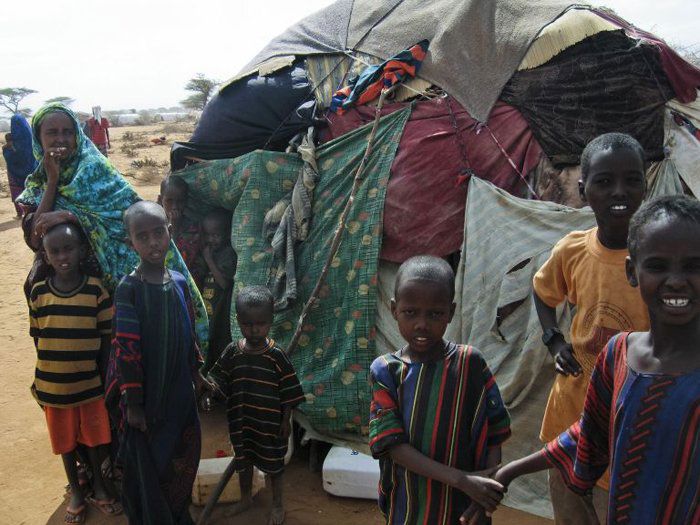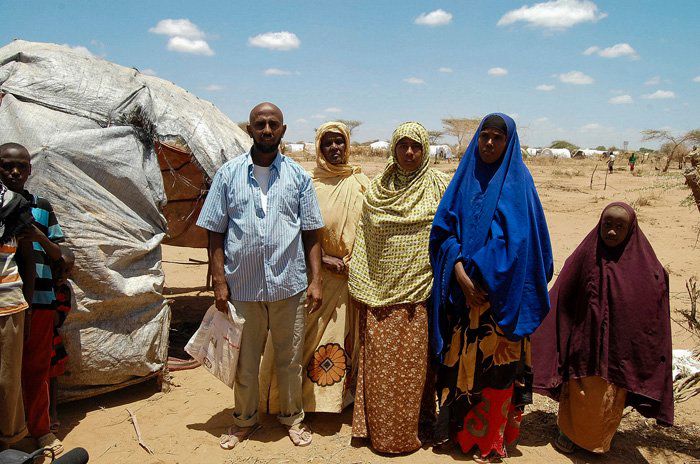Despite several aid agencies, including MSF, ready to assist the more than four hundred daily new arrivals, the negotiations for the opening of the new camp continue to be blocked.
The Ifo II refugee camp was meant to house the constant influx of thousands of new arrivals fleeing war and drought in Somalia. Instead, two months after the refugees were supposed to be relocated (November 2nd), the Ifo II camp still lies empty whilst thousands of refugees live in appalling humanitarian conditions on the outskirts of the already congested Dagahaley camp in Dadaab.
In the first two weeks of January alone, almost 6,000 refugees have made the perilous journey from Somalia to Dadaab. However, instead of finding the necessary assistance and protection, refugees are caught in the middle of negotiations for opening the new camp and are left in unacceptable and undignified conditions outside the camp.
“The minimum international humanitarian standards are not being met. The refugees have scarce access to water, food, non-food items and shelter. There are no latrines, making open defecation the only option, and thus increasing the risk of the spread of disease, particularly in this vulnerable population group that is already fleeing years of war” says MSF Humanitarian Affairs Officer, Elena ESTRADA.
Last November, MSF already warned about the situation of refugees in spontaneous settlements outside Dagahaley where the makeshift shelters and food supplies were destroyed after heavy rains, further deteriorating the squalid living conditions and health status of the refugees.
Insecurity is another problem these refugees face. The majority of the new arrivals are children, women and the elderly. Living outside the camps mean they have little or no protection and are vulnerable to further violence.
In Ifo II, aid agencies are waiting to resettle the refugees in an area equipped with clean water accessible in safe conditions as well as sanitation, schools and health services. An MSF medical team has been on stand-by since last October ready to assist patients in a temporary health structure whilst a 45 bed hospital is being built.
Established in early 1991, the Dadaab camps were meant to house 90,000 refugees. In 2008 the three camps were declared full and unable to host more refugees. Dadaab currently hosts over 308,000 refugees. After negotiations with the local community, elected leaders, provincial administration and Member of Parliament, in December 2009, the UNHCR was granted an extension of Ifo camp, with the capacity to accommodate 80,000 refugees. In July 2010, MSF committed to provide health care services in Ifo II. Despite MSF’s commitment towards the refugee population and redeployment of resources, MSF has not been able to assist the refugees, as Ifo II is still not operational.
MSF urgently calls on the responsible actors involved in the negotiations to allow for the immediate reallocation of the refugees from Dagahaley camp in Dadaab to Ifo II extension camp.
MSF has been assisting Somalis since 1992. The medical humanitarian organisation started work in Dagahaley camp in March 2009, providing medical care including surgery and maternal health services, in a 110-bed hospital. The four MSF health centres offer vaccinations, antenatal care and mental healthcare with an average of 10,000 patient consultations every month.
The Ifo II refugee camp was meant to house the constant influx of thousands of new arrivals fleeing war and drought in Somalia. Instead, two months after the refugees were supposed to be relocated (November 2nd), the Ifo II camp still lies empty whilst thousands of refugees live in appalling humanitarian conditions on the outskirts of the already congested Dagahaley camp in Dadaab.
In the first two weeks of January alone, almost 6,000 refugees have made the perilous journey from Somalia to Dadaab. However, instead of finding the necessary assistance and protection, refugees are caught in the middle of negotiations for opening the new camp and are left in unacceptable and undignified conditions outside the camp.
“The minimum international humanitarian standards are not being met. The refugees have scarce access to water, food, non-food items and shelter. There are no latrines, making open defecation the only option, and thus increasing the risk of the spread of disease, particularly in this vulnerable population group that is already fleeing years of war” says MSF Humanitarian Affairs Officer, Elena ESTRADA.
Last November, MSF already warned about the situation of refugees in spontaneous settlements outside Dagahaley where the makeshift shelters and food supplies were destroyed after heavy rains, further deteriorating the squalid living conditions and health status of the refugees.
Insecurity is another problem these refugees face. The majority of the new arrivals are children, women and the elderly. Living outside the camps mean they have little or no protection and are vulnerable to further violence.
In Ifo II, aid agencies are waiting to resettle the refugees in an area equipped with clean water accessible in safe conditions as well as sanitation, schools and health services. An MSF medical team has been on stand-by since last October ready to assist patients in a temporary health structure whilst a 45 bed hospital is being built.
Established in early 1991, the Dadaab camps were meant to house 90,000 refugees. In 2008 the three camps were declared full and unable to host more refugees. Dadaab currently hosts over 308,000 refugees. After negotiations with the local community, elected leaders, provincial administration and Member of Parliament, in December 2009, the UNHCR was granted an extension of Ifo camp, with the capacity to accommodate 80,000 refugees. In July 2010, MSF committed to provide health care services in Ifo II. Despite MSF’s commitment towards the refugee population and redeployment of resources, MSF has not been able to assist the refugees, as Ifo II is still not operational.
MSF urgently calls on the responsible actors involved in the negotiations to allow for the immediate reallocation of the refugees from Dagahaley camp in Dadaab to Ifo II extension camp.
MSF has been assisting Somalis since 1992. The medical humanitarian organisation started work in Dagahaley camp in March 2009, providing medical care including surgery and maternal health services, in a 110-bed hospital. The four MSF health centres offer vaccinations, antenatal care and mental healthcare with an average of 10,000 patient consultations every month.



